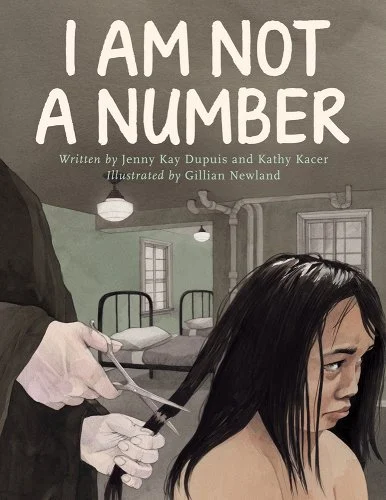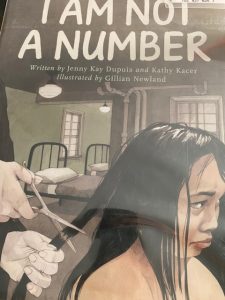The Radical Agenda may utilize affiliate links for recommended books and resources. This means we may earn a small commission from clicks or purchases through those links at no cost to you. We only recommend products and services we believe in. All opinions shared are entirely our own. Thank you for supporting The Radical Agenda!
I Am Not A Number by Jenny Kay Dupuis and Kathy Kacer Synopsis
I Am Not A Number by Jenny Kay Dupuis and Kathy Kacer is focused on the true story of co-author Jenny Kay Dupuis’ grandmother Irene Couchie. The book begins as she and her brothers are forcefully removed from their home by an agent and taken to a residential school far away from where they live. For a year, she was referred to as Number 749 instead of her name, had her hair cut short, and was tortured for speaking her native language. The book describes how she was forced to hold a metal bedpan full of hot coals for saying “thank you,” to another student in their native language.
In the end, when the agent returns the following year to collect the children for another term, she and her brothers hid in a shed and avoided capture.
Why is it called I Am Not A Number?
In an effort to eliminate all aspects of Native culture, the residential schools stripped the children of their hair, clothing, and names, and replaced them with standardized (short) hairstyles, basic clothing, and new names. Sometimes those names were just replaced with a number. Irene Couchie, the primary person in the book, refused to be reduced to being called Number 749, and insisted to herself “I am not a number.”
Read more: 10 Native American Children’s Books for Elementary Age
What is a Residential School?
Residential schools were Native American boarding schools in the United States and Canada with the stated goal of providing colonized education to Native American children. However, the actual reason for the Residential Schools was much darker: Civil War Captain and founder of the Carlisle Residential School in Pennsylvania, Richard Henry Pratt, described his goal of residential education as “Kill the Indian in him, and save the man.” Simply put, the goal of these residential schools for Native American children was less about education and more about forced assimilation.
In May of 2021 news broke in Canada of bodies being found buried in the grounds of residential schools. Hundreds, then thousands, of bodies were discovered and these discoveries were how many people across North America even learned that residential schools existed, much less how recently they were still open and what kinds of atrocities occurred inside their halls. Stories began to be shared from survivors about the abuse they endured at these “schools.”
But how do you teach this topic to young children?
I Am Not A Number does this with age-appropriate, yet still heartbreaking details.
I Am Not A Number Themes
I appreciated the realness of the book. It was brutally honest, and told from the perspective of an eight-year-old girl, with a spirit of factual innocence. There is no analyzing of behaviors, no complex emotional struggles, just a young child who missed her family and did not understand why such horrible things were happening to her.
Conversations
Currently my sons are seven- and four-years-old, respectively. After reading I Am Not A Number together, we talked about racism and colonialism. I asked them how they would feel if someone came through our front door, told us that they lived here now, and demanded that we look and act like them. They said they would feel sad, and my four-year-old added that he would feel angry, because we like the way we live and what we look like.
We talked about how every person deserves to be treated with respect and dignity, and how different people groups have traditions that are unique to their cultures that don’t need to be changed just because someone else decided that their particular way of existence is better than the other.
My seven-year-old stated “I’m glad I was born white so I wouldn’t be taken from you,” which gave us a wonderful opportunity to talk about his favorite Spider-Man quote “with great power comes great responsibility.” We discussed how his skin color gives him the privilege of safety from bad things like residential schools, but he needs to use that privilege to stand up for others who are at risk. We can protect others by standing up to bullies in real time, going to protests, and making informed decisions when voting.
Talking about these topics doesn’t have to be complex. They can begin with deeply moving true stories like this one, and just simply talking about values like respect, dignity, and empathy.
Kids are smarter and more astute than we give them credit for.
Where to Buy I Am Not a Number
I Am Not A Number by Jenny Kay Dupuis and Kathy Kacer is available whereever books are sold. I prefer to purchase books through Bookshop.org because every purchase supports local and independent bookstores.
Children’s Books About Diverse Baseball Players
Picture Books About Diverse Baseball Players It’s the beginning of April and that means that baseball season is officially upon us! And here on the blog, that means it’s time to share a list of children’s books about diverse baseball players. While baseball has been...
Movies for Black History Month
Movies for Black History Month While I recognize that this is a website focused on books, I want to make sure we included some movies for those readers who are more visual learners. If you prefer watching a movie to reading a book, keep reading for the best movies for...
3 Children’s Books about Black Doctors
Children's Books about Black Doctors It’s officially February, which means it’s Black History Month here in the United States! As a nurse, for me it’s also Heart Month – a month where we wear red, call attention to the causes and consequences of heart disease,...



0 Comments